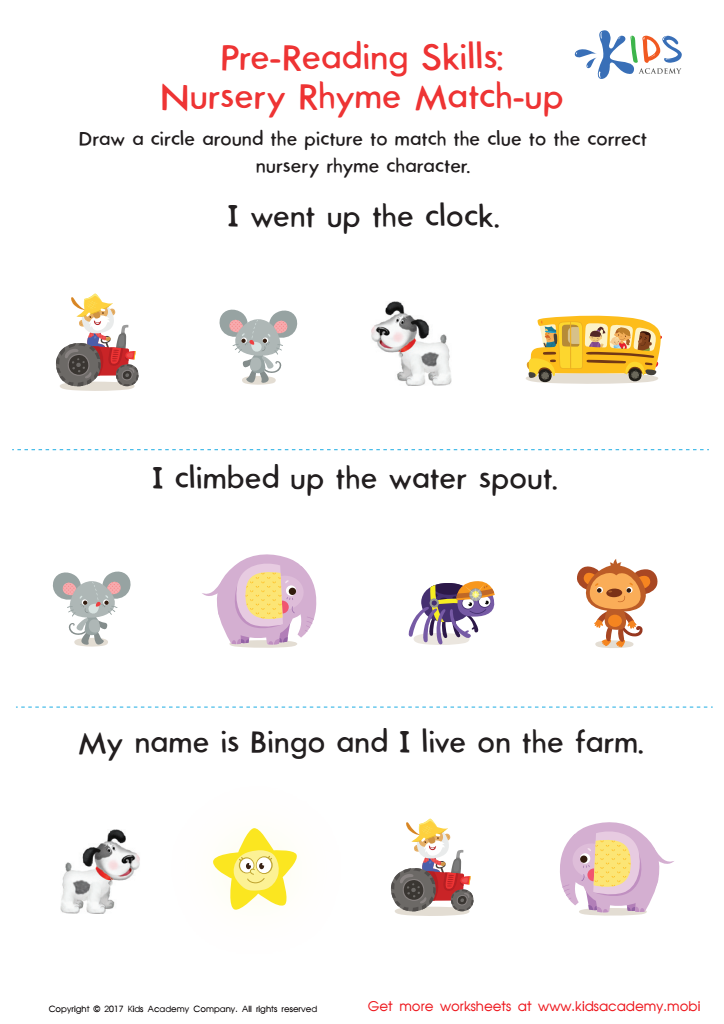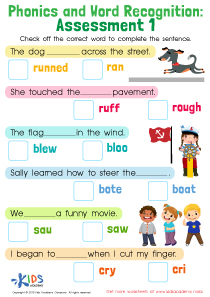Easy Second Grade Rhyming Worksheets
1 filtered results
-
From - To
Learning Easy Rhyming Worksheets for Grade 2
Introducing our Easy Phonics Rhyming Words Worksheets, designed specifically for Grade 2 students who are ready to develop their reading and language skills. These worksheets contain a variety of exercises focused on phonics and rhyming words, guaranteed to help your child improve their reading fluency and comprehension. The fun and engaging activities include matching rhyming words, identifying the odd word out, and filling in missing words to complete a rhyme. With these interactive and colorful worksheets, your child will have a blast learning and mastering essential reading skills. So, get your hands on these Phonics Rhyming Words Worksheets today and watch your child's reading ability soar!


Nursery Rhyme Match–Up Worksheet
The Importance of Phonics Rhyming Words Worksheets in Grade 2 Language Learning
Phonics Rhyming Words Worksheets are an effective and essential tool to have in the learning environment of Grade 2 students, helping them develop critical skills in reading, writing, and language comprehension. These worksheets serve as a useful and engaging teaching aid that assists students in mastering the phonics of the English language and building their vocabulary.
The importance of Phonics Rhyming Words Worksheets is that they offer a structured and sequential approach towards teaching students to recognize and decipher words through phonetic sounds. By identifying the sounds that make up words and their context within a sentence, students develop basic comprehension skills that help them to read effectively. With practice, students can efficiently read more challenging texts and absorb the meaning with ease.
Using Rhyming Words Worksheets helps students to develop their phonological awareness, which is the ability to identify and manipulate sounds within a language. The aspect of rhyming, in particular, helps to build children's cognitive development and phonemic awareness skills. Recognizing and internalizing the sound patterns of different words, students enhance their vocabulary, spelling, and acquisition of additional reading skills.
The worksheets also incorporate the use of pictures, encouraging students to associate words with their corresponding images. This strategy reinforces the links between sounds, words, and their visual representation, which is crucial in building and maintaining a child's attention and focus when learning.
Furthermore, these worksheets-in addition to enhancing reading and writing skills- help students develop their speaking skills. By correctly understanding and pronouncing phonemes and words, students build their confidence when speaking, develop their listening skills, and learn how to communicate accurately and effectively.
Teachers appreciate these worksheets for their flexibility and ease of use. These resources come with ready-made prompts, allowing for quick and easy implementation in classroom instruction. Students can work on the worksheets independently or in small groups, reflecting different learning styles and the level of the student's ability.
In summary, Phonics Rhyming Words Worksheets serve as indispensable tools that promote reading, writing, and language comprehension. These worksheets provide an adaptable and engaging platform for teaching phonics, and their use provides students with the opportunity to elevate their reading and writing skills while encouraging cognitive development. By incorporating these resources into their teaching arsenal, teachers are helping their students to develop lifelong skills that will benefit them beyond the classroom.
 Assign to the classroom
Assign to the classroom





